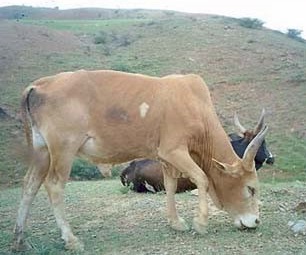Heat, humidity kill hundreds of US cattle during world's hottest month
Cattle also died from heat in Kansas and Nebraska, state officials said. Iowa's Department of Natural Resources told Reuters it received a request on July 31 "to dispose of approximately 370 cows that died due to heat in western Iowa recently." Gary Vetter, who raises cattle in western Iowa, said he worked to protect local herds but about 53 cattle died at three of his neighbors' feedlots during the last week in July. "They just start dropping and there was nothing you could really do about it," Vetter said.

- Country:
- United States
Hundreds of cattle died in Iowa from extreme heat and humidity in late July, the state and livestock producers said, as the world recorded its hottest month ever.
The deaths show the toll of severe weather on farm animals and food production. The losses further trim the U.S. cattle herd, which is already the smallest in decades after drought drove ranchers to slaughter more cows due to a lack of pasture to feed them. While not massive in number, producers said the recent deaths were unusual. Cattle also died from heat in Kansas and Nebraska, state officials said.
Iowa's Department of Natural Resources told Reuters it received a request on July 31 "to dispose of approximately 370 cows that died due to heat in western Iowa recently." Gary Vetter, who raises cattle in western Iowa, said he worked to protect local herds but about 53 cattle died at three of his neighbors' feedlots during the last week in July.
"They just start dropping and there was nothing you could really do about it," Vetter said. "I've never seen anything like it." Heat is usually most dangerous for the heaviest cattle that weigh more than 1,000 pounds (450 kg), but temperatures and humidity spiked so high that even lighter 700-pound cattle died, Vetter said.
In Carroll, Iowa, near Vetter's farm, the heat index climbed to 117 degrees Fahrenheit (47 degrees Celsius) on July 28, the National Weather Service said. Two hundred miles away (322 km), in the northeastern Iowa city of Riceville, Bob Noble said two of his cattle died in different pens, the first deaths he has linked to heat in years. The 1,100-pound to 1,200-pound carcasses will be composted.
"They just couldn't handle the extra stress of the heat and humidity," said Noble, president of the Iowa Cattlemen's Association. Iowa is the fifth largest cattle-producing state and had 630,000 cattle in feedlots on July 1, according to the U.S. Department of Agriculture.
The USDA offers disaster assistance that may help compensate producers whose cattle died. Kansas received a request for disposal of 50 cattle due to heat stress this summer, said Matthew Lara, spokesman for the Kansas Department of Health and Environment. Last summer, the state had at least 2,000 cattle deaths when an early June heat wave caught producers off guard.
In Nebraska, phones started ringing at the state's Department of Environment and Energy on July 26 or July 27, spokeswoman Amanda Woita said. On the line were "informal phone calls from producers who have experienced cattle deaths due to heat," she said, without providing death tolls. Nebraska feedlots house 2.3 million cattle, while Kansas feedlots have 2.4 million cattle.
To prevent losses, Kansas State University in June updated an online weather tool, Kansas Mesonet, to use National Weather Service forecasts to predict comfort levels for cattle a week ahead of time. Previously, the tool provided day-of weather data, said Christopher "Chip" Redmond, a meteorologist and manager of Kansas Mesonet.
"By then it's too late," he said.
(This story has not been edited by Devdiscourse staff and is auto-generated from a syndicated feed.)










